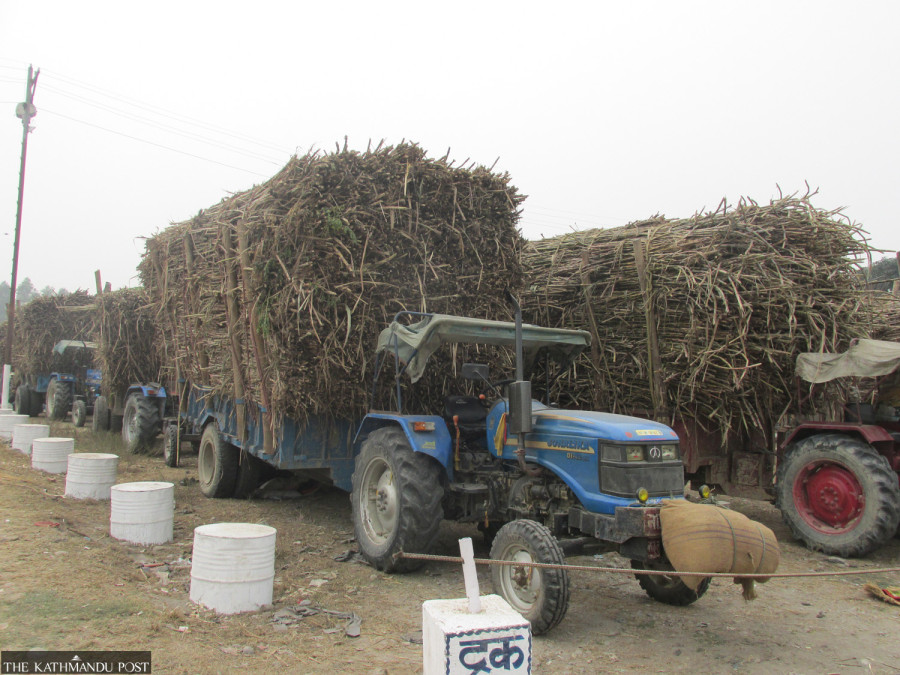Money
Left in the lurch, Nepali sugarcane farmers struggle to stay in business
WTO says India violated trade rules when it offered excessive subsidies to the production and export of sugar and sugarcane.
Krishana Prasain & Shiva Puri
A World Trade Organisation panel on Tuesday declared that India violated international trade rules when it offered excessive subsidies to the production and export of sugar and sugarcane.
The panel said India violated the WTO agriculture agreement when it provided excessive non-exempt product-specific subsidies to sugarcane producers between 2014 and 2019.
The WTO said India must remove its illegal subsidies within 120 days of the adoption of the report.
The dispute dates back to 2019 when Brazil, Australia and Guatemala filed parallel WTO complaints that alleged the Indian government massively increased its sugar subsidies and reintroduced a minimum price for sugar, which led to increased production of sugar that outstripped domestic demand.
India is the world’s second largest sugar producer after Brazil.
According to reports, India can appeal the ruling at any point in the next 60 days, a move that would act like a veto because the WTO’s appellate body is not functioning.
The decision may cheer Nepali sugarcane farmers and sugar producers who have long been complaining that they can't compete with the heavily-subsidised Indian sugar.
But a trade expert said the decision would not affect Nepal in terms of trade.
“As per the bilateral trade agreement with India, goods that receive subsidies should not be exported,” said trade economist Posh Raj Pandey.
In the context of Nepal, India has been exporting sugar under a quota system to which Nepal has granted special permission.
Nepal charges a heavy 30 percent duty on sugar imported from India to protect domestic industry.
“So the WTO verdict will not directly impact Nepal’s domestic sugar market,” Pandey told the Post.
"India is a global producer of sugar, and the subsidies have suppressed market prices impacting the global price," Pandey said.
“But if the subsidies are withdrawn, it will increase the global price,'' he said. “And if the global price goes up, it could impact the domestic sugar price,” he said.
Due to the price variation in sugarcane between Nepal and India, demand for Nepali cane has been dropping. Traders say that despite the high import duty, sugar imported from India is still cheaper.
“The cost of growing sugarcane is very high,” said Hari Narayan Sah, a farmer of Gadhimai-4, Sagrampur.
Shree Ram Sugar Mill, where he used to sell his crop, has now closed down. “Now, I don't think I will plant sugarcane,” said Sah, the oldest sugarcane farmer in the district.
He has been planting sugarcane on his 6-bigha farm for the last two decades. "I have gradually stopped growing sugarcane," he said.
Shree Ram Sugar Mill has been closed for a year since going belly-up after making a Rs350 million payout to sugarcane farmers for their crops that had been pending from 2014.
Shree Ram Sugar Mill located in Garuda started crushing sugarcane obtained from farmers in Bara, Parsa and Rautahat in 1992. The mill had a capacity to crush 300,000 tonnes of sugarcane in a single season.
When the mill was established, 18,000 farmers in Rautahat began growing sugarcane. They planted sugarcane in the hope that there would be no hassles in selling their crops.
But the number of sugarcane farmers in Rautahat declined after the crop started bringing them only hardship.
“In the beginning, 280,000 tonnes of sugarcane was produced,” said Satyendra Yadav, secretary of the Sugarcane Producers’ Association, Rautahat. "Now, half of the farmers have abandoned sugarcane farming."
With the sugarcane harvest already started, farmers said the government has delayed fixing the minimum support price.
Kapil Muni Mainali, president of the Federation of Sugarcane Producers Association, said that it would have been better if the government had fixed the sugarcane price in mid-November.
“We have already submitted the cost of production of sugarcane to the ministry. Sugarcane production has plunged by around 50 percent with farmers facing losses and not being able to get their cost price on time,” he said.
According to Mainali, sugarcane production has been declining continuously since 2012.
Last year, sugarcane farmer Narayan Raya Yadav of Sarlahi died due to a heart attack during a protest movement held to press sugar mills to pay farmers for their crops.
“The price of sugarcane has not increased since 2005, but the price of sugar has swelled to Rs90 per kg from Rs62. Moreover, sugarcane farmers do not get paid for their harvest on time, and they need to protest to get their money,” said Mainali.
Following the decline in sugarcane production, mills are facing a shortage of raw materials. "The sugar mills cannot run for even one and a half months," said Mainali. “In the past, sugar mills used to operate for 120 days non-stop.”
The minimum support price of sugarcane is fixed by the Agriculture Ministry. The ministry then recommends the price to the Ministry of Industry, Commerce and Supply that reviews the price and tables it to the Cabinet for approval.
Prakash Kumar Sanjel, joint secretary at the Ministry of Agriculture and Livestock Development, said the ministry was holding discussions to fix the minimum support price.
“We have a certain process to fix the price, and we are studying it,” Sanjel said. “We will fix the price once the sugar mill owners and farmers agree on the price so that no disputes will occur,” he added.
The Agriculture Ministry conducted a field study that collected data on farmers' cost of production. The sugar mill owners and sugarcane farmers have also submitted their report regarding the price.




 8.54°C Kathmandu
8.54°C Kathmandu















